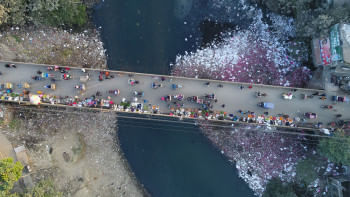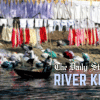Rivers cannot be saved without honest efforts

Among the many discrepancies that mark its governance records, Bangladesh has had to contend with a unique reality in which we have a globally recognised climate champion in our PM, but also the misfortune of seeing her words repeatedly fall on deaf ears when it comes to protecting our rivers. On Monday, the PM again made an impassioned appeal to save rivers, stressing that rivers are to Bangladesh what veins are to the body. She also instructed relevant departments to prioritise integrated projects to restore the navigability of all rivers and canals in and around Dhaka.
Will her directives be properly followed this time? There is no guarantee that they will, if the past is any indication. We have seen a similar lack of impact following such instructions and warnings by the apex court as well. If the expressed sincerity of the highest authorities were enough to stop river pollution and encroachment, Bangladesh would long have ridden itself of this scourge. The question is, why is it so hard to move from expression to implementation? Is it because of a lack of proper follow-up? Is it because of deeply entrenched systemic issues stalling progress? Is it because of any collusion between politically linked river killers and state officials? Is it because of the lack of accountability? It can be all of the above.
The fact is, due to the persistent failure of the relevant authorities as well as a lack of awareness, most of our rivers are at risk of decay or death. At least 56 rivers are currently suffering from "extreme pollution" due to indiscriminate waste disposal. Whereas pollution was confined to rivers surrounding megacities like Dhaka and Chattogram before, it has now spread to every part of the country. This has had a devastating effect not just on rivers' biodiversity and navigability but also on the health and livelihoods of those dependent on them. Our rivers have also been routinely subjected to encroachments and other illegal practices such as sand mining.
To prevent this collective "rivercide" is no easy feat. But we must try, for our own survival. Given the multidimensional threats facing rivers, the National River Conservation Commission (NRCC), with little executive power, cannot be solely responsible for it. What's needed is a collective effort by the various government departments and agencies dealing with rivers and river lands. We urge all to understand the urgency of taking meaningful actions to save our rivers.


 For all latest news, follow The Daily Star's Google News channel.
For all latest news, follow The Daily Star's Google News channel. 










Comments